

Manufacturing is special. Poor countries have access to world markets, off-the-shelf technologies developed by others, and rich countries’ savings.
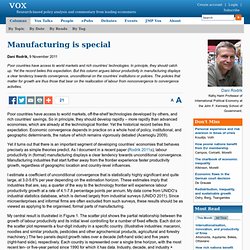
So in principle, they should develop rapidly – more rapidly than advanced economies, which are already at the technological frontier. Yet the historical record belies this expectation. Economic convergence depends in practice on a whole host of policy, institutional, and geographic determinants, the nature of which remains vigorously debated (Acemoglu 2009). Yet it turns out that there is an important segment of developing countries’ economies that behaves precisely as simple theories predict. As I document in a recent paper (Rodrik 2011a), labour productivity in (formal) manufacturing displays a clear tendency towards unconditional convergence. Race Against the Machine. Artificial intelligence: Difference Engine: Luddite legacy. AN APOCRYPHAL tale is told about Henry Ford II showing Walter Reuther, the veteran leader of the United Automobile Workers, around a newly automated car plant.
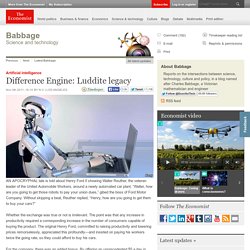
“Walter, how are you going to get those robots to pay your union dues,” gibed the boss of Ford Motor Company. Without skipping a beat, Reuther replied, “Henry, how are you going to get them to buy your cars?” Whether the exchange was true or not is irrelevant. The point was that any increase in productivity required a corresponding increase in the number of consumers capable of buying the product. The original Henry Ford, committed to raising productivity and lowering prices remorselessly, appreciated this profoundly—and insisted on paying his workers twice the going rate, so they could afford to buy his cars.
Ecosystem & Porter. A common characteristic of Next generation organisations (as opposed to traditional) is their focus on ecosystems and the provision of platforms to support their growth.
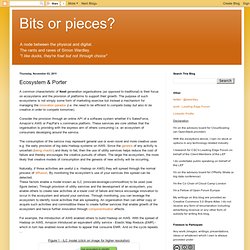
The purpose of such ecosystems is not simply some form of marketing exercise but instead a mechanism for managing the innovation paradox (i.e. the need to be efficient to compete today but also to be creative in order to compete tomorrow). Local Money Creates Wealth Outside the Bubble. Ever since the crash several years ago, Americans have felt precarious about the nation's economy and the value of its currency.

Money seems to take inconceivable, abstract, and even magical forms, traveling around the world at lightening speed with little oversight and obvious mismanagement. We have little control over it — the value of our currency is tied to conditions well beyond our control. It moves in directions that most of us are vehemently opposed to. We trusted that the banks, Congress, the Federal Reserve, corporations and Wall Street are managing money responsibly on our behalf, particularly with retirement funds and mortgages, but lately that trust has been broken. In response, local currencies have drawn interest from Occupy and other economic resistance groups to create an alternative to state-controlled money.
An introductory series on “peer to peer” urbanism (bio-urbanism) I’ve asked Øyvind Holmstad to introduce a new series of essays on bio-urbanism which are appearing in Metropolis magazine.

They are all to be found here. And Øyvind Holmstad’s introduction is here. The essays in chronological order: * The Radical Technology of Christopher Alexander * The Sustainable Technology of Christopher Alexander * The Pattern Technology of Christopher Alexander * The Living Technology of Christopher Alexander * The “Wholeness-Generating” Technology of Christopher Alexander.
The myth of financial innovation and the Great Moderation. Many changes have taken place in the financial sector over the last couple of decades.
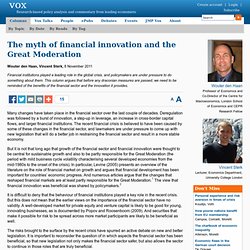
Deregulation was followed by a burst of innovation, a step-up in leverage, an increase in cross-border capital flows, and larger financial institutions. The recent financial crisis is believed to have been caused by some of these changes in the financial sector, and lawmakers are under pressure to come up with new legislation that will do a better job in restraining the financial sector and result in a more stable economy. But it is not that long ago that growth of the financial sector and financial innovation were thought to be central for sustainable growth and also to be partly responsible for the Great Moderation (the period with mild business cycle volatility characterising several developed economies from the mid-1980s to the onset of the crisis). It is difficult to deny that the behaviour of financial institutions played a key role in the recent crisis. The maker movement's potential for education, jobs and innovation is growing.
Dale Dougherty (@dalepd), one of the co-founders of O’Reilly Media, was honored at the White House yesterday as a “Champion of Change.”
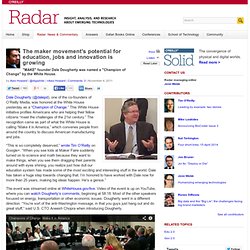
This White House initiative profiles Americans who are helping their fellow citizens “meet the challenges of the 21st century.” The recognition came as part of what the White House is calling “Make it in America,” which convenes people from around the country to discuss American manufacturing and jobs. “This is so completely deserved,” wrote Tim O’Reilly on Google+. Innovation, education and Makers. On the Monday following Maker Faire New York, the National Science Foundation (NSF) sponsored a workshop titled “Innovation, Education and the Maker Movement.”
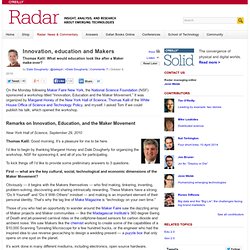
It was organized by Margaret Honey of the New York Hall of Science, Thomas Kalil of the White House Office of Science and Technology Policy, and myself. I asked Tom if we could publish his talk, which opened the workshop. New York Hall of Science, September 29, 2010. Three game characteristics that can be applied to education. In a related post, I talked about what the notion of gamification as applied to education might mean on three levels.

In particular, I described the lessons that might be learned by the field of education from the different types of gaming encountered in World of Warcraft and Minecraft — two very different online multiplayer games. In this post, I look at the technology roadmap that can support these three levels of application in real schools. Level 1: Leveling up and questing The first level is one where leveling, questing, and leaderboards can help motivate students to engage more with their schoolwork. Like a gamer who chooses his or her own path and pace to “level up,” a student will choose his or her own path and pace to learn a standard curriculum and be able to prove advancement to that next level through performance on tests. Chart: One Year of Prison Costs More Than One Year at Princeton - Brian Resnick - National.
Monique W.
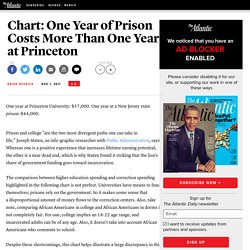
Morris, the co-founder of the National Black Women’s Justice Institute, offers tactics to work against damaging stigmas. The “good girl” and “bad girl” dichotomy, as chronicled by Monique W. Morris in Pushout: The Criminalization of Black Girls in Schools, is a condition that has plagued black girls and women for time immemorial.
Society’s deeply entrenched expectations of black girls—influenced by racism and patriarchy—has led to a ritual whereby these young women are often mischaracterized, and mislabeled because of how they look, dress, speak, and act. Putting extended families under 1 roof - latimes.com. Home is where not only the heart is these days — but also the elderly parents, the boomerang kids and the aging-in-place Boomer homeowners. Zen and the Art of Making. This week for my bi-weekly soapbox column, I thought I’d share some of my notes I’ve jotted down recently about making things, working with and supporting beginners.
Lately, I’ve been thinking about how much fun it is when you’re a beginner at something as opposed to being an “expert.” At some point, we all become experts at something. I really want to avoid being an expert in some things, only so I can continually look forward to learning more without the overhead of being an expert. Differing Attitudes Toward Genuine Hypocrisy. Paul Krugman has a question for you: Genuine Hypocrisy, And Attitudes Thereto, by Paul Krugman: Not sure how much blogging I can do this weekend... But here’s an item that caught my eye, given what I wrote about hypocrisy yesterday: Deadbeat Rep. Joe Walsh, Who Owes $100k In Child Support, Receives ‘Pro-Family’ Award From Family Research Council. Miscellaneous. More than half of Florida homeowners in default are 2 years overdue.
More than half of Florida homeowners in foreclosure have not made a mortgage payment in two years or more. That's higher than the national average and one indication of why banks are paying borrowers up to $20,000 to execute a short sale. A new report from Jacksonville-based LPS Applied Analytics found that as of September, 56 percent of Florida's mortgages in foreclosure are 24 months or more behind in payments, compared with 39 percent nationwide. About 84 percent of Florida foreclosures are more than 18 months in arrears. Considering recent figures that estimate the time from initial filing to auction at 676 days in Florida, LPS Senior Vice President Herb Blecher said, he's not shocked by the mounting late payments. In January 2010, just 19 percent of Florida's foreclosures were 24 months or more delinquent. Living with the folks - Nov. 4.
NEW YORK (CNNMoney) -- With job openings scarce, getting adult children to leave the nest is becoming a lot more difficult. The number of adult children who live with their parents, especially young males, has soared since the economy started heading south. Among males age 25 to 34, 19% live with their parents today, a 5 percentage point increase from 2005, according to Census data released Thursday. Meanwhile, 10% of women in that age group live at home, up from 8% six years ago. Capital Institute. Peter Victor–eminent ecological economist, winner of the Canadian Council for the Arts' prestigious Molson Award, and author of Managing Without Growth–challenges us to reframe our economic discussions to focus on managing material and energy flows rather than GDP growth.
Artificial intelligence: Difference Engine: Luddite legacy. The Polarization of Job Opportunities in the U.S. Labor Market. When offshoring backfires. As the global economic downturn grinds on, more companies are acknowledging that labour costs aren’t always the most important factor when deciding where to build their next factory. Disrupting the Disruptors: Three Design Patterns for Combatting Disruption in Incumbent Organizations. Divining a Digital Future. Divining a Digital Future - Paul Dourish and Genevieve Bell. Paul Dourish and Genevieve Bell MIT Press, May 2011 ISBN 978-0-262-01555-4 Amazon.com pageMIT Press catalog entry.
Forum. UCSD Study: Not Enough Bandwidth for an 'Internet of Things' Yesterday's groundbreaking proposal by IBM for a new and open-source asynchronous protocol for machine-to-machine (M2M) Internet communication, called MQTT, cites a projected 1000x (put another way, 100,000%) increase in broadband device-generated traffic by the year 2020, and the need for a formal protocol for managing it all. Now, a study from the University of California San Diego's Global Information Industry Center (GIIC) projects, using data supplied by numerous sources including the FCC and network systems leader Cisco, suggests that bandwidth of that magnitude doesn't just simply fall out of the sky. Without even taking into account the M2M traffic increases IBM researchers seek to facilitate, state Michael Kleeman, director Roger Bohn, and the GIIC team, the rate of mobile traffic growth is forecast by analysts to be a mere 1,800% over four years. On businesses that sustain the commons.
Qdot/keepoff - GitHub. Technological Plateau or Promise? The Era of Small and Many. Economy Driving More Americans to Extreme Poverty. What Do The Occupiers Want? Phase Change. The Five Big Surprises of Radical Management. Global Village Construction Set by Marcin Jakubowski.
The Desktop Regulatory State. Rad Geek People's Daily 2008-05-29 – Dump the rentiers off your back. Make the Dangerous Choice to Dissent - Umair Haque. Why your startup should use data competitions. The Ethics of Sharing. What Is Free Culture? Is Consumer Capitalism Outdated? Solitude and Leadership. Anthropology extracts the true nature of tech. Utopia is creepy. Talent Management - October 2011 [26 - 27] Google+ Ripples Feature Shows How Posts Are Shared. BJMendelson.com. The Middleware Connection: Scala, Akka, and Heroku. How do we achieve a civil(ised) economy?
How Can Business-to-Business Trade Networks Build Local Resilience. Microsoft Offers a Glimpse into the Future of Productivity - The Official Microsoft Blog – News and Perspectives from Microsoft. Alf Hornborg on How We Have Been Mystified by Technology. The long slow make. David Li on the merger of open hardware with Chinese Shanzai manufacturing. US Employment to Population Ratio Continues Annual Decline. Boom In Shadow Financing Exacts High Toll In China.
Mcor Technologies. The future is amazing, and Microsoft has video to prove it. Paul Hartzog on turning the Internet into a real ecosystem by enabling interoperability. Are American workers in a race against the machine? All Watched Over by Machines of Loving Grace. Startups, Innovation and the Decline of the Corporation. The future of work: What happens when talent trumps capital? Wen talent trumps capital? DB's review of Race Against The Machine: How the Digital ... Kickstarter campaign for the Global Village Construction Set. Does Redistributing Income Reduce Poverty? - Jagdish Bhagwati. Why Companies Can't Find the Employees They Need - WSJ.com#articleTabs%3Darticle. Money As Debt II: promises unleashed (full movie) Evolution and Innovation - Information Is Cheap, Meaning Is Expensive. Fixing America's Economy: Nine Ideas from Around the World. Economic Letter: What's in Your Wallet? The Future of Cash (2011-33, 10/24/2011)
Social complexity. Richard Wilkinson: How economic inequality harms societies. More Jobs Predicted for Machines, Not People" P2P-driven fall in transaction costs and the coming Micro-Ownership Revolution. Skills shortages is a global problem. Changing the World through Crowdsourcing « What’s the cause of the Great Recession: debt or a fall of profit? Detroit as the exemplar of the Next Revolution.
Umair Haque: at the heart of the eudaimonic life and economy stands meaningful and impactful engagement. Moving from a sharing to a solidarity economy. Gar Alperovitz on Reforming the Corporation for a New Economy. Bangkok Flooding Has Taken 25% Of The World's Hard Disk Manufacturing Capacity Offline. Energy: Friend or Enemy? by William D. Nordhaus. Huntsman's Warning on 'Too Big to Fail' Nouriel Roubini's Global EconoMonitor » Full Analysis: The Instability of Inequality.
Growth through scarcity? How do we achieve a True Cost Economy? Hybrid Wisdom Labs Launches A Speedy, Scalable Engine For Visualizing Customer Insight. Social hacking, not just technological hacking. The Singularity and the economy.